【商务英语】市场营销(中英)
Marketing 1 市场营销1 商务英语

02 What Is
Marketed?
Scope of Marketing
1. Goods 2. Services 3. Experiences 4. Events 5. Persons
6. Places 7. Properties 8. Organizations 9. Information 10.Ideas
Industrial/Business Market: In this market, the industrial or business buyers purchase products like raw materials (iron ore, coke, crude oil etc.), components (wind-screen, tyres, picture tubes, micro-processors etc.), finished products (packaging machine, generators etc.), office supplies (computers, pens, paper etc.) and maintenance and repair items (grease, lubricating oil, broom etc.). Apart from products, due to outsourcing the industrial buyers also require a number of services like accounting services, security services, advertising, legal services etc. from the providers of these services.
市场营销(英文版)
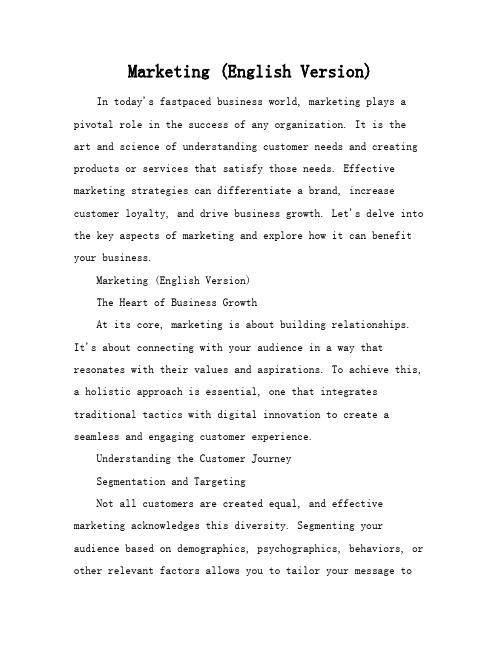
Marketing (English Version) In today's fastpaced business world, marketing plays a pivotal role in the success of any organization. It is theart and science of understanding customer needs and creating products or services that satisfy those needs. Effective marketing strategies can differentiate a brand, increase customer loyalty, and drive business growth. Let's delve into the key aspects of marketing and explore how it can benefit your business.Marketing (English Version)The Heart of Business GrowthAt its core, marketing is about building relationships.It's about connecting with your audience in a way that resonates with their values and aspirations. To achieve this, a holistic approach is essential, one that integrates traditional tactics with digital innovation to create a seamless and engaging customer experience.Understanding the Customer JourneySegmentation and TargetingNot all customers are created equal, and effective marketing acknowledges this diversity. Segmenting your audience based on demographics, psychographics, behaviors, or other relevant factors allows you to tailor your message todifferent groups. This targeted approach ensures that your marketing efforts are more relevant and, consequently, more effective.The Power of StorytellingStories are a universal language that can evoke emotions and create lasting memories. In marketing, storytelling is a powerful tool that can humanize your brand and make it more relatable. By crafting narratives that align with yourbrand's values and mission, you can forge a deeper connection with your audience and inspire them to take action.Leveraging Digital ChannelsMeasuring SuccessMarketing is an investment, and like any investment, it needs to be measured for return. Key performance indicators (KPIs) such as conversion rates, customer acquisition costs, and customer lifetime value provide a clear picture of your marketing efforts' effectiveness. By analyzing these metrics, you can refine your strategies, optimize your budget, and ensure that your marketing activities contribute to your business's bottom line.Continuous ImprovementMarketing (English Version)The Art of Persuasion and EngagementThe essence of marketing lies in its ability to persuade and engage. It's not just about selling products; it's about selling an experience, a lifestyle, and a vision. Here's how businesses can harness the full potential of marketing to achieve their goals.Crafting a Compelling Brand IdentityInfluencing Consumer BehaviorUnderstanding the psychology behind consumer behavior is crucial for marketers. By identifying the triggers that lead to purchasing decisions, you can design campaigns that nudge potential customers towards conversion. This involves not only the rational aspects of product features and benefits but also the emotional appeal that can often be the deciding factor in a consumer's choice.The Role of Content MarketingContent marketing is the strategic creation and distribution of valuable, relevant, and consistent content to attract and retain a clearly defined audience. It's about educating your customers, entertaining them, and providing solutions to their problems. From blog posts to videos, infographics to podcasts, highquality content can establish your brand as an authority in your industry and build trust with your audience.Collaborating with InfluencersCustomer Engagement and Retention Ethical Marketing Practices。
现代商务英语第6章促销(Sales Promotion)

第6章 促销
(Sales Promotion)
A Reviver letter 振兴信
the “Reviver”, the purpose of which is to keep the regular customers and to expend the business, because they are the main buyers of sales potential.
2. Demographic factors
Demographic changes also influence the international firm. For many products, population size may be used as a broad preliminary indicator of market potential. However, population size should only be used in conjunction with income levels and other measures, as a large population may represent little potential where income levels are quite low.
10
3. Characteristics of culture
For the firm in international markets there are four major characteristics of culture: a) it is learned, b) interrelated, c) adaptive and d) may operate at times as subcultures including nationality, religion, age and occupation. The two ways in which a person develops cultural norms and values are learning by socialization and learning through accumulation.
商务英语词汇大全
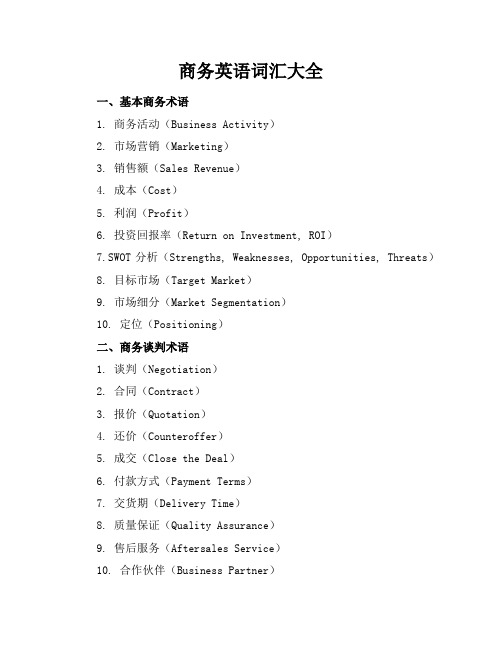
商务英语词汇大全一、基本商务术语1. 商务活动(Business Activity)2. 市场营销(Marketing)3. 销售额(Sales Revenue)4. 成本(Cost)5. 利润(Profit)6. 投资回报率(Return on Investment, ROI)7.SWOT分析(Strengths, Weaknesses, Opportunities, Threats)8. 目标市场(Target Market)9. 市场细分(Market Segmentation)10. 定位(Positioning)二、商务谈判术语1. 谈判(Negotiation)2. 合同(Contract)3. 报价(Quotation)4. 还价(Counteroffer)5. 成交(Close the Deal)6. 付款方式(Payment Terms)7. 交货期(Delivery Time)8. 质量保证(Quality Assurance)9. 售后服务(Aftersales Service)10. 合作伙伴(Business Partner)三、商务函电术语1. 询盘(Inquiry)2. 报盘(Offer)3. 订单(Order)4. 发票(Invoice)5. 装箱单(Packing List)6. 信用证(Letter of Credit, L/C)7. 汇票(Bill of Exchange)8. 托运单(Shipping Order)9. 提单(Bill of Lading)10. 保险(Insurance)四、人力资源术语1. 招聘(Recruitment)2. 简历(Resume)3. 面试(Interview)4. 培训(Training)5. 薪资(Salary)6. 福利(Benefits)7. 绩效考核(Performance Appraisal)8. 晋升(Promotion)9. 劳动合同(Labor Contract)10. 职业规划(Career Planning)五、企业运营术语1. 企业战略(Corporate Strategy)2. 企业文化(Corporate Culture)3. 组织结构(Organizational Structure)4. 部门(Department)5. 团队协作(Teamwork)6. 项目管理(Project Management)7. 生产计划(Production Plan)8. 供应链管理(Supply Chain Management)9. 库存(Inventory)10. 客户关系管理(Customer Relationship Management, CRM)六、财务与会计术语1. 财务报表(Financial Statements)2. 资产(Assets)3. 负债(Liabilities)4. 所有者权益(Owner's Equity)5. 现金流(Cash Flow)7. 资产负债表(Balance Sheet)8. 利润分配(Profit Distribution)9. 折旧(Depreciation)10. 纳税(Taxation)七、国际贸易术语1. 进口(Import)2. 出口(Export)3. 贸易壁垒(Trade Barrier)4. 关税(Tariff)5. 配额(Quota)6. 原产地证明(Certificate of Origin)7. 贸易术语(Trade Terms,如FOB、CIF等)8. 国际支付(International Payment)9. 外汇(Foreign Exchange)10. 世界贸易组织(World Trade Organization, WTO)八、市场营销策略术语1. 市场调研(Market Research)2. 产品生命周期(Product Life Cycle)3. 广告(Advertising)4. 促销(Promotion)5. 公关(Public Relations)6. 品牌战略(Brand Strategy)7. 网络营销(Internet Marketing)8. 社交媒体营销(Social Media Marketing)9. 客户满意度(Customer Satisfaction)10. 忠诚度计划(Loyalty Program)九、企业管理术语1. 领导力(Leadership)2. 决策(Decision Making)3. 风险管理(Risk Management)4. 企业伦理(Business Ethics)5. 知识管理(Knowledge Management)6. 创新能力(Innovation Capability)7. 企业形象(Corporate Image)8. 危机管理(Crisis Management)9. 持续改进(Continuous Improvement)10. 企业社会责任(Corporate Social Responsibility, CSR)十、电子商务术语2. 在线支付(Online Payment)3. 网络安全(Network Security)4. 顾客评价(Customer Review)6. 网络营销策略(Online Marketing Strategy)7. 搜索引擎优化(Search Engine Optimization, SEO)8. 率(Clickthrough Rate, CTR)9. 转化率(Conversion Rate)通过这些词汇的积累,您将能够在商务交流中更加得心应手,展现出您的专业素养和沟通能力。
商务英语阅读教程 Unit 4
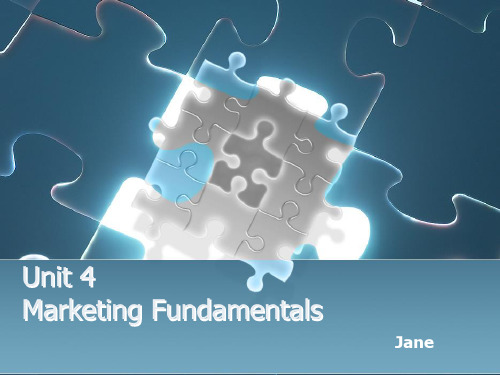
Marketing is the ongoing process of 【moving people closer to making a decision (to purchase,
use, follow or conform to someone else’s products, services or values) 】.
翻译
营销一词的含义是什么?市场营销是一个不断 推进的过程,该过程的目的是促使人们心动到 做出各种决定诸如购买他人的各种产品、享用 他人提供的各种服务、以及遵循他人的各种价 值取向。营销人员运用市场营销推广组合的变 量来制定营销推广计划。
4-2
Comprehensive Reading
主语
修饰 process
C. Sometimes (50%) D. Never(0%)
In what ways are you easily persuaded into buying something? By______.
A. TV commercial B. Newspaper Advertisement C. Quality D. package E. Brochures F. Leaflets G. Price H. After-sales service
n. 产品 n. 制造业者,厂商 市场调查
媒体计划
产品推广
n. 品牌 n. 市场营销 媒体计划
n. 形象塑造 实体环境
n. 人员 n. 放置 目标市场
公共关系
distribution channel generic advertising at no cost marketing effort process drawback product pricing marketing mix charge junk mail sales strategy at regular price
商务英语(市场营销专业英语)课程教学大纲
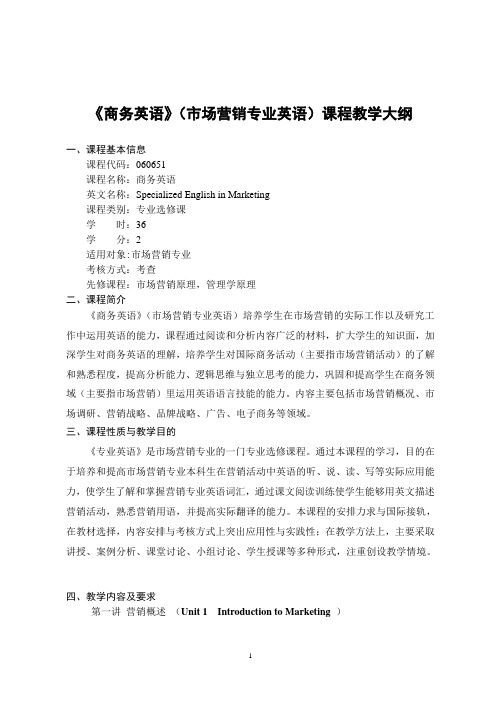
《商务英语》(市场营销专业英语)课程教学大纲一、课程基本信息课程代码:060651课程名称:商务英语英文名称:Specialized English in Marketing课程类别:专业选修课学时:36学分:2适用对象:市场营销专业考核方式:考查先修课程:市场营销原理,管理学原理二、课程简介《商务英语》(市场营销专业英语)培养学生在市场营销的实际工作以及研究工作中运用英语的能力,课程通过阅读和分析内容广泛的材料,扩大学生的知识面,加深学生对商务英语的理解,培养学生对国际商务活动(主要指市场营销活动)的了解和熟悉程度,提高分析能力、逻辑思维与独立思考的能力,巩固和提高学生在商务领域(主要指市场营销)里运用英语语言技能的能力。
内容主要包括市场营销概况、市场调研、营销战略、品牌战略、广告、电子商务等领域。
三、课程性质与教学目的《专业英语》是市场营销专业的一门专业选修课程。
通过本课程的学习,目的在于培养和提高市场营销专业本科生在营销活动中英语的听、说、读、写等实际应用能力,使学生了解和掌握营销专业英语词汇,通过课文阅读训练使学生能够用英文描述营销活动,熟悉营销用语,并提高实际翻译的能力。
本课程的安排力求与国际接轨,在教材选择,内容安排与考核方式上突出应用性与实践性;在教学方法上,主要采取讲授、案例分析、课堂讨论、小组讨论、学生授课等多种形式,注重创设教学情境。
四、教学内容及要求第一讲营销概述(Unit 1 Introduction to Marketing)(一)目的与要求1.本讲要求学生掌握市场营销的一些基本概念,如市场营销、市场营销战略、4P等;2.要求熟悉市场营销的历史发展阶段;3.要求了解市场营销每个历史发展阶段的特点。
(二)教学内容1.主要内容:1)S ome concepts in marketing;2)The evolution of marketing:production era,sales era, marketing era, relationship marketing era3)Case study: strategic issues in Chinese marketing2.基本概念和知识点:基本概念:marketing,marketing strategy,position,segmentation,target market, 4Ps(product, place, price, promotion ), brand value知识点:have some knowledge of the 4Ps in Chinese market3.问题与应用(能力要求): 无。
商务英语unit3译文及答案
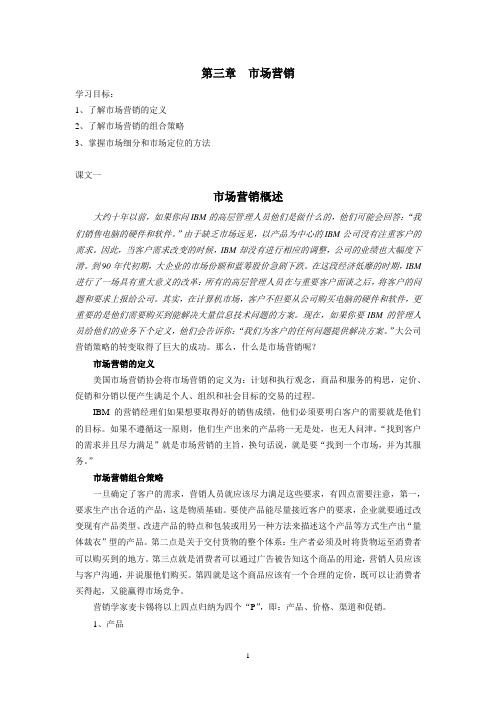
第三章市场营销学习目标:1、了解市场营销的定义2、了解市场营销的组合策略3、掌握市场细分和市场定位的方法课文一市场营销概述大约十年以前,如果你问IBM的高层管理人员他们是做什么的,他们可能会回答:“我们销售电脑的硬件和软件。
”由于缺乏市场远见,以产品为中心的IBM公司没有注重客户的需求。
因此,当客户需求改变的时候,IBM却没有进行相应的调整,公司的业绩也大幅度下滑。
到90年代初期,大企业的市场份额和蓝筹股价急剧下跌。
在这段经济低靡的时期,IBM 进行了一场具有重大意义的改革:所有的高层管理人员在与重要客户面谈之后,将客户的问题和要求上报给公司。
其实,在计算机市场,客户不但要从公司购买电脑的硬件和软件,更重要的是他们需要购买到能解决大量信息技术问题的方案。
现在,如果你要IBM的管理人员给他们的业务下个定义,他们会告诉你:“我们为客户的任何问题提供解决方案。
”大公司营销策略的转变取得了巨大的成功。
那么,什么是市场营销呢?市场营销的定义美国市场营销协会将市场营销的定义为:计划和执行观念,商品和服务的构思,定价、促销和分销以便产生满足个人、组织和社会目标的交易的过程。
IBM的营销经理们如果想要取得好的销售成绩,他们必须要明白客户的需要就是他们的目标。
如果不遵循这一原则,他们生产出来的产品将一无是处,也无人问津。
“找到客户的需求并且尽力满足”就是市场营销的主旨,换句话说,就是要“找到一个市场,并为其服务。
”市场营销组合策略一旦确定了客户的需求,营销人员就应该尽力满足这些要求,有四点需要注意,第一,要求生产出合适的产品,这是物质基础。
要使产品能尽量接近客户的要求,企业就要通过改变现有产品类型、改进产品的特点和包装或用另一种方法来描述这个产品等方式生产出“量体裁衣”型的产品。
第二点是关于交付货物的整个体系:生产者必须及时将货物运至消费者可以购买到的地方。
第三点就是消费者可以通过广告被告知这个商品的用途,营销人员应该与客户沟通,并说服他们购买。
商务英语unit4 Marketing
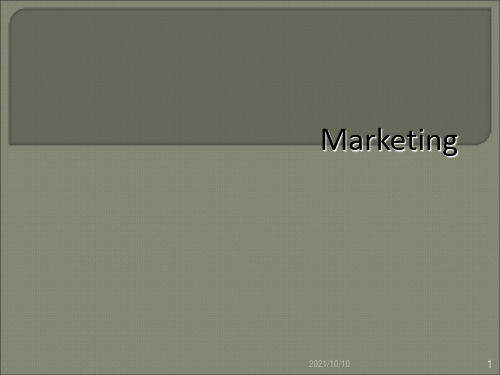
2021/10/10
2
What is Marketing?
Kotler’s definition:
“Marketing is a social and managerial process by which individuals and groups obtain what they need and want through creating and exchanging products and value with others.”
2021/10/10
20
Product
The product is the physical product or service offered to the consumer. In the case of physical products, it also refers to any services or conveniences that are part of the offering. Product decisions include aspects such as function, appearance, packaging, service, warranty, etc.
• Consumers favor products that are available and highly affordable
• Improve production and distribution
• Consumers favor products that offer the most quality, performance and innovative features
Marketing Concept
- 1、下载文档前请自行甄别文档内容的完整性,平台不提供额外的编辑、内容补充、找答案等附加服务。
- 2、"仅部分预览"的文档,不可在线预览部分如存在完整性等问题,可反馈申请退款(可完整预览的文档不适用该条件!)。
- 3、如文档侵犯您的权益,请联系客服反馈,我们会尽快为您处理(人工客服工作时间:9:00-18:30)。
1.Marketing 市场营销:通过计划和执行关于产品、服务和电子的定价、促销和分销,从而创造交换,以实现个人和组织的目标的过程)The process of planning and executing (执行、实行)the conception, pricing, promotion, and distribution of goods, services and ideas to create exchanges that satisfy individual and organizational objectives.——the definition emphasizes the diverse activities marketers perform.(强调市场商人不同的行为活动)❖Deciding what products to offer❖Setting prices❖Developing sales promotions and advertising campaigns❖Making products readily available to customers2. The marketing Concepts(市场营销观念:企业分析消费者需求,制定比竞争对后更好的决策来满足这些需求的哲学)❖The Production Concept 生产观念❖The Selling Concept 推销观念❖The Marketing Concept 市场营销观念The Production Concept 生产观念The idea that a firm should focus on those products that it could produce most efficiently and that the low-cost products would create the demand for those products.The Selling Concept / sales concept 推销观念(利用广告这种重要方式来与其顾客沟通从而获取他们的订单) The Marketing Concept市场营销观念Difference between Selling and Marketing销售与营销的区别3.The Marketing Mix / The 4P’s of Marketing市场营销组合1)Product(产品:有形和无形,包括包装、色彩、品牌、服务,甚至销售商的声誉)Consumer products消费品:produced for and purchased byhouseholds for their use.Industrial products 工业产品:are sold primarily for use inproducing other products.2)Price(价格:消费者为获得产品所必须支付的金额)Refers to the value or worth of a product that attracts the buyer to exchange money or something of value for the product.Loss Leader Pricing(亏本出售商品)selling things in its lower price than its cost price in order to attract customers to purchase the products.Penetration Pricing (渗透定价法---心理定价策略)设定最初低价,以便迅速和深入地进入市场,从而快速吸引来大量的购买者,赢得较大的市场份赖。
is a pricing strategy where the organization sets a low price to increase sales and market share. “Introductory”.Price Skimming(撇脂定价法---心理定价策略)将产品的价格定的较高,尽可能在产品生命初期,在竞争者研制出相似的产品以前,尽快的收回投资,并且取得相当的利润。
Means the charging of relatively high prices that take advantage of early customers’ strong need for the new product, and then decreasing it slowly as sales begin to decline.Differential Pricing(区别定价法)involves allowing the same product to be priced differently.3)Place (分销:代表公司为使产品达到目标顾客手中所进行的各种活动)Place / Distribution refer to how you will sell your products to your customers.4)Promotion(促销:代表公司宣传其产品优点和说服目标顾客购买所进行的各种活动)Personal selling(人员销售)、Advertising、Sales promotion(销售促销)、Publicity(宣传)4.The Product Life Cycle 产品生命周期(PLC)❖Introduction Phase 引入期❖Growth Phase 成长期❖Maturity Phase 成熟期❖Decline Phase 衰退期(4p-市场营销在每一个时期呈现的不同特点)Limitations of the Product Life Cycle Concept 产品生命周期的局限性---不适用于产品销量的预测,之使用与一般预测。
5.1)Consumer Buying Behavior(消费者购买行为:作为个人使用产品和决策构成消费者购买行为。
社会、心理、人口和环境因素)Need recognition →Search→Evaluation of alternatives(比较同类产品讯息)→Purchase decision→After-purchase evaluation(评估购买行为)Several factors affect the buying decision of consumers.❖Social factors: family members , peers❖Psychological factors: attitude, personality❖Personal characteristics: age, education❖Specific conditions2)Industrial Buying Behavior 企业购买行为The purchase decision making of organization such as manufacturers, service providers, government agencies, institutions, and non-profit groups is referred to as industrial buying behavior.6.Marketing Research (市场营销调研有效的调研包括5个步骤)Forming the research question确定问题和研究目标Research design制定调研计划Data collection: secondary data, primary data资料搜集Data analysis资料分析Choosing the best solution确定最好的解决方法7.Market Segmentation (市场细分:按照购买者所需的个别产品或营销组合,把一个市场分为若干不同的购买者群体的行为)The division of a market into different homogeneous group of consumers.❖Mass marketing(大量营销)❖Target marketing(目标营销)1)Requirements of Market Segments 市场细分的要求❖Identifiable(可确认的): The differentiating attributes(部分)of the segments must be measurable so that they can be identified.❖Accessible(可以达到的):The segments must be reachable through communication and distribution channels.❖Substantial: The segments should be sufficiently large to justify the resources required to target them.❖Unique needs(独特的需求):To justify separate offerings, the segments must respond differently to the different marketing mixes.❖Durable(耐用持久的):The segments should be relatively stable to minimize the cost of frequent changes.2)Segmentation Bases 细分依据❖Geographic segmentation bases(地理因素): city, state, region.❖Demographic segmentation bases(人口因素):age, income,education, occupation, sex, race, social class.❖Psychographic segmentation bases(消费心理因素): attitudes, personality, opinions, lifestyles, interests, motives.❖Behaviouralistic segmentation(消费行为因素): Based on actual customer behavior toward products.。
